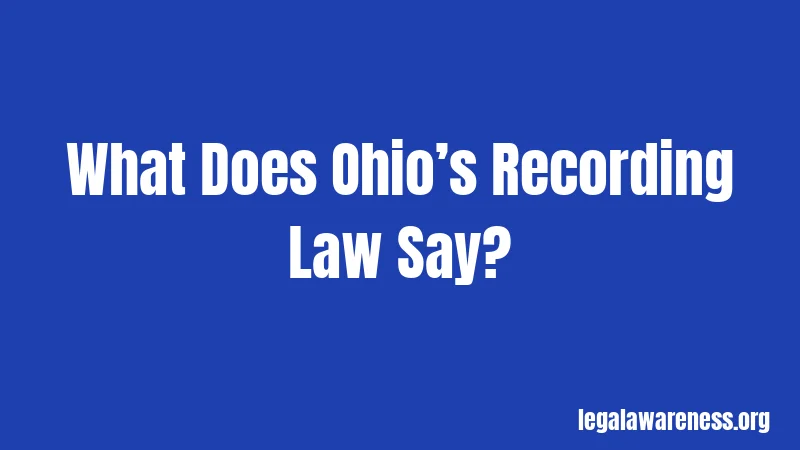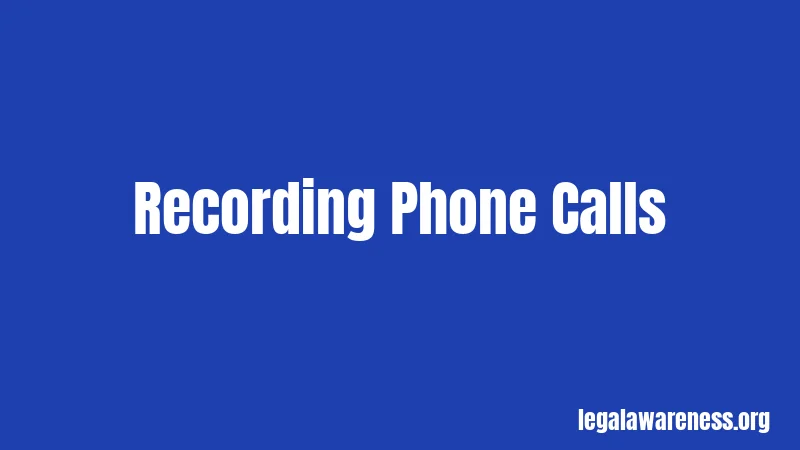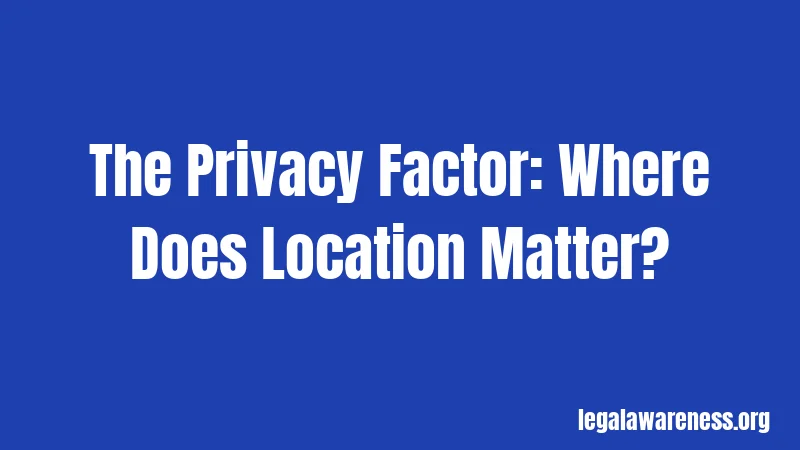Ohio Recording Laws in 2026: Know What’s Legal Before You Hit Record
Most people have no idea that secretly recording someone could land them in serious legal trouble. Seriously. But in Ohio, recording laws are strict, and breaking them can mean jail time or hefty fines. Stay with me here, because this stuff matters more than you might think.
Whether you’re recording a phone call, capturing a conversation, or filming someone, you need to know Ohio’s rules. We’re gonna break down exactly what you can and can’t do legally.
What Does Ohio’s Recording Law Say?

Here’s the thing about Ohio’s recording laws: they’re pretty specific. Ohio is what’s called a “one-party consent” state. That sounds technical, but it’s actually simple.
In a one-party consent state, at least one person in a conversation needs to know the conversation is being recorded. That person can be you. You can legally record a conversation if you’re part of it. You don’t need permission from everyone else involved. Yep, that’s all you need.
But here’s where it gets tricky. If you’re not part of the conversation, you generally can’t record it without everyone’s permission. Recording someone without their knowledge when you’re not involved is illegal.
The Basic Rule: One-Party Consent
Let’s make this super clear. If you’re having a conversation and you record it, that’s legal in Ohio. You already know what’s being said because you’re right there. You don’t need to tell the other person you’re recording.
Think of it like this: you’re participating in the conversation, so you have every right to document it. Ohio’s law assumes that’s fair.
But notice the key word: you have to be part of the conversation. You can’t hide in the corner and record two other people talking. That’s a completely different story.
Wondering if your specific situation is legal? Let’s look at some real examples.
Recording Phone Calls

Okay, this one’s important. In Ohio, you can record your own phone calls without telling the other person. You’re part of the conversation, so you have consent.
A friend asked me about this last week. He wanted to record a business call to remember the details later. Turns out, that’s totally legal in Ohio as long as he’s on the phone.
But here’s the catch: if someone calls you from another state, that state’s laws might apply. Less severe than traveling across state lines to break the law, but still something to watch out for.
For example, if someone from California calls you and you record it, California’s two-party consent law might apply instead. You’d need everyone’s consent. Don’t assume Ohio rules protect you in every situation.
Recording Conversations in Person
Can you record someone talking to you face to face? Yes, absolutely. You’re part of that conversation, so Ohio says you can hit record without asking permission first.
You could be recording a conversation with a coworker, a family member, or even someone you met on the street. As long as you’re actively part of the discussion, you’re in the clear legally.
But wait, it gets more complicated. What if you’re in a location where there’s an expectation of privacy? More on that in a second.
The Privacy Factor: Where Does Location Matter?

Here’s where things get interesting. Ohio law considers whether people have a reasonable expectation of privacy in where they are.
If you’re in a public place where anyone could hear the conversation, there’s less expectation of privacy. You can generally record there. A coffee shop, a park, a store—these are public spaces where conversations are more exposed.
Private spaces are different. Your home, your office with the door closed, a bathroom, a doctor’s office. These places have an expectation of privacy. Recording someone in these locations without consent could cause legal problems beyond just the recording law.
You might also face trespassing charges or civil lawsuits for invasion of privacy. The recording law is just one piece of the puzzle.
Phone Recording and the “Eavesdropping” Law
Hold on, this part matters. Ohio’s recording law connects to something called the “eavesdropping statute.” It’s Ohio Revised Code Section 2933.52.
What’s eavesdropping exactly? It means recording a conversation without the consent of at least one party in that conversation. In normal English: secretly recording people talking when you’re not involved.
This law covers phone calls, in-person conversations, and even electronic communications. The penalty for eavesdropping can be serious.
Breaking this law is typically a felony. Personally, I think this law makes sense when you consider how invasive secret recordings can be. If you’re caught eavesdropping, you’re facing real jail time, not just a fine.
Consent Recording: What You Need to Know
You’re legally allowed to record a conversation where you’re a participant. But there’s a smart way to do this and a risky way.
The smart way? Be honest about it. Tell people you’re recording. That way, there’s zero legal gray area. Everyone knows what’s happening. You have explicit consent, which is even better than implied consent.
The risky way? Record secretly, relying on the one-party consent rule. Technically, it might be legal. Realistically, it can blow up in your face. The other person might feel violated. They might file a civil lawsuit for emotional distress or invasion of privacy.
Hold on, here’s something important: even if recording is legal, using the recording illegally is a separate crime. You can’t record something legally and then use it for blackmail, threats, or harassment. That’s a whole different level of illegal.
Penalties for Breaking Ohio’s Recording Laws
Let’s talk about what happens if you break these laws. Not fun stuff, honestly.
If you’re caught illegally recording someone, you could face felony charges. Eavesdropping without consent is a felony in Ohio, usually a fourth-degree felony.
A fourth-degree felony can mean up to 18 months in prison. You could also face a fine up to $5,000. That’s not a small amount of money.
More severe cases, like recording multiple people or recording in a high-security location, could result in a third-degree felony. That means 6-12 months in prison, though sometimes it can go longer.
Plus, there are civil consequences. The person you recorded can sue you for invasion of privacy or emotional distress. You might have to pay them money damages. Civil lawsuits can cost thousands of dollars, even if you win.
Think of it like a traffic ticket, but way more serious. It’s not something you bounce back from easily.
Recording Police and First Responders
What about recording cops? This is where people get confused. And honestly, it makes sense why.
You can legally record police officers in Ohio. Officers performing their duties in public don’t have a reasonable expectation of privacy. You can film them, record them, take photos.
But here’s the nuance: you can’t interfere with their work. You need to stay back. You can’t obstruct their path or distract them. If you’re recording from a safe distance without interfering, you’re fine legally.
Many people assume this is legal everywhere. They find out the hard way it’s not. Some states restrict recording police. Ohio isn’t one of them. You’re actually protected by the First Amendment when recording in public.
That said, use common sense. Police might not like being recorded, but that doesn’t make it illegal for you. If an officer tells you to stop, you don’t have to legally, but you probably should if you want to avoid escalation.
Recording in Workplaces
Workplace recording gets complicated. Here’s the real deal: Ohio allows one-party consent recording, but your employer might have different rules.
Your company might have a policy against recording. They could fire you for it even if the recording itself is legal. Employment is different from criminal law.
If you’re recording a meeting you’re part of, it’s probably okay legally. But check your employee handbook or ask HR first. You could lose your job and still be technically legal.
Recording other employees without being part of the conversation is illegal. Planting a recording device in the break room? That’s definitely crossing the line. You’d be eavesdropping.
Recording in Schools
Schools are sensitive places. Recording in schools in Ohio depends on what you’re recording and where.
If you’re recording your child’s school event with permission, no problem. Schools often allow parents to film performances or graduations.
Recording in areas where there’s a clear expectation of privacy is different. Bathrooms, locker rooms, private offices. You can’t record there, period.
Recording teachers in classrooms without permission is a gray area legally. Some might say it’s one-party consent if the student is part of the class. Others might argue privacy expectations change in educational settings.
Honestly, this is probably the part most people miss. Ask the school’s administration before recording. You don’t want legal problems with your child’s school.
Medical and Legal Conversations
Here’s an important exception: some conversations have special protection. If you’re talking to a doctor or a lawyer, different rules might apply.
These professionals sometimes have privileged communications. Recording without permission, even under Ohio’s one-party consent rule, might create legal problems beyond the recording law.
A therapist or counselor has ethical obligations about recordings. Even if it’s technically legal, they might refuse to work with you if they know you’re recording.
For legal consultations, your attorney might prohibit recordings of your conversations. Always ask before recording with professionals.
Recent Changes to Ohio Recording Law
Ohio’s recording laws have stayed pretty consistent. But awareness about recording is increasing. Courts have been more active in interpreting these laws in recent years.
Some recent cases have clarified what “reasonable expectation of privacy” means. The courts are getting stricter about where recordings are acceptable.
Phone recording also connects to federal laws. The federal wiretapping statute applies in addition to Ohio law. If you break federal law, federal charges apply, which are even more serious.
Can You Record Video Instead of Audio?
Video recording has similar rules to audio recording. If it’s in a public place and you’re not violating someone’s privacy, it’s generally legal.
Recording someone on a public street, in a store, or in a park is usually fine. Recording them in their home or a private place without permission is illegal.
But there’s something extra to watch for: reasonable expectation of privacy in appearance. Some courts have ruled that recording someone in ways they wouldn’t expect (like focusing on private body parts) might violate privacy laws even in public.
This one’s probably the most important rule. Always think about where someone can reasonably expect privacy. If they’d be shocked you’re recording them there, reconsider.
Recording in Social Media and Online Spaces
Social media gets weird legally. If someone posts online, are you allowed to record or screenshot their content?
Generally, yes, you can. Public posts on social media are shared with the world. There’s no expectation of privacy.
But sharing private messages or recording someone’s video chat without consent? That’s different. That could be illegal eavesdropping.
Recording someone’s Zoom call without permission is risky. Even if it seems like it’s “online,” they have an expectation that only invited people are participating. Recording without consent might be illegal.
What About Recording Consent Forms?
Some people ask other people to sign consent forms before recording. Is that necessary in a one-party consent state?
Not legally. In Ohio, you already have the right to record conversations you’re part of. A consent form isn’t required.
But is it smart? That’s a different question. Getting written consent removes any doubt. It shows good faith. If you’re ever in legal trouble, having signed consent looks really good.
For important conversations, honestly, just get written consent. It takes five minutes and protects everyone.
How to Legally Record: Step by Step
Alright, let’s say you want to record something legally. Here’s what you should do.
First, make sure you’re part of the conversation. You need to be an actual participant, not hiding on the sidelines.
Second, use a reliable device. Your phone, a recorder, a camera. Make sure it actually captures what you need.
Third, tell people you’re recording. Seriously, just say it. “I’m recording this conversation to remember the details later.” Most people will say okay.
Fourth, keep the recording safe. Don’t lose it. Don’t accidentally share it publicly. Know where it is.
Fifth, never use the recording for illegal purposes. No blackmail, no threats, no posting it to embarrass someone.
Finally, if you’re in any doubt, ask a lawyer. It’s worth a consultation to avoid legal trouble later.
Questions About Recording and Privacy
Not sure what counts as a violation? Let me break down some common scenarios.
Scenario One: Your boss makes promises in a meeting. You’re sitting right there. Can you record it? Yes, as long as you’re involved in the conversation and Ohio law applies.
Scenario Two: You overhear coworkers talking at their desks. You want to record to catch someone saying something bad. Can you? No, you’re not part of that conversation. That’s eavesdropping.
Scenario Three: Your friend calls you from another state. Can you record? Maybe, but be careful. The other state’s law might apply. Two-party consent states would require their consent too.
Scenario Four: You’re in a public park and someone attacks you. You record it on your phone. Can you use that video? Yes, absolutely. It’s evidence of a crime.
Frequently Asked Questions
Can I record someone without their knowledge in Ohio? Only if you’re part of the conversation and it’s not in a place with a reasonable expectation of privacy. If you’re secretly recording people who don’t know about it and you’re not involved, that’s illegal eavesdropping.
What’s the difference between recording and eavesdropping? Recording as a participant is legal. Eavesdropping means secretly recording when you’re not part of the conversation. One-party consent means you can record, but the other person can still get angry and sue you.
Can I record my child’s school events? Yes, usually, if the school allows it. Ask permission first. Recording teachers or other children without consent in private spaces is riskier legally.
Is recording a conversation for my own memory legal? Yes, if you’re part of the conversation. You don’t even need to tell the other person in Ohio, though it’s smarter if you do.
What if I record someone without consent and they sue me? Even if recording is legal criminally, you can still face civil lawsuits for invasion of privacy or emotional distress. You might have to pay money damages.
Can I record on my property without telling anyone? Recording people on your own property is more protected, but you still need to respect reasonable expectations of privacy. Recording someone in your guest bedroom without consent is still problematic.
What if someone records me without permission? What can I do? If the recording is illegal, you can report it to police. If it’s legal but they’re using it to harm you, you might have civil remedies like a lawsuit for invasion of privacy.
Does the consent have to be written? No, verbal consent is fine. Written consent is just safer because you have proof.
Are there exceptions to Ohio’s one-party consent rule? Yes, conversations with doctors, lawyers, and therapists sometimes have special protections. Also, conversations in places with clear privacy expectations are off limits.
What happens if I accidentally record something I shouldn’t have? Delete it. Don’t share it. Don’t use it. If you delete it quietly and don’t cause harm, you’re probably okay. If you use it illegally, that’s when real trouble starts.
Final Thoughts
Now you know the basics of Ohio’s recording laws. The big takeaway: you can record conversations you’re part of, but recording secretly when you’re not involved is illegal.
Think before you hit record. Ask yourself: Am I part of this conversation? Is there a reasonable expectation of privacy here? What will I do with this recording?
When in doubt, ask permission. Tell people you’re recording. Get it in writing if it’s important. Stay honest, and you’ll stay out of legal trouble.
If you’re facing a specific situation and you’re unsure, talking to a lawyer makes sense. It’s worth the investment to keep yourself safe legally.
Stay informed, stay smart, and record responsibly.
References
Ohio Revised Code Section 2933.52 – Eavesdropping
Ohio Revised Code Section 2933.51 – Disclosure or use of contents of wire or oral communications
Electronic Frontier Foundation: Recording Laws by State
American Bar Association: Recording Laws
